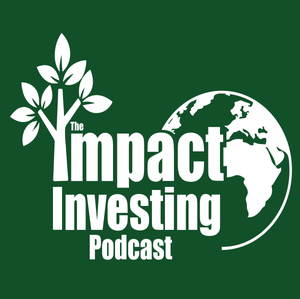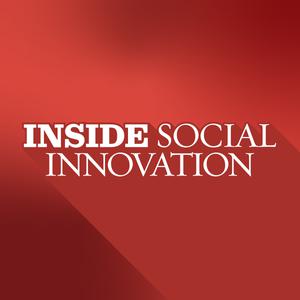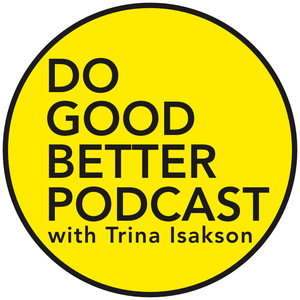
Inspiring Social Entrepreneurs Podcast
[email protected] (Fergal Byrne)
At Inspiring Social Entrepreneurs, we talk to experienced and successful social entrepreneurs and change makers, committed to building a better world. Working as a social entrepreneur is hugely fulfilling – yet uniquely challenging. Social entrepreneur
- 1 hour 9 minutesEpisode 112: Unlocking AI for Social Good-- Insights from Ashoka’s AI Lab
In this fascinating episode, Fergal Byrne sits down with Odin Mühlenbein, co-leader of Ashoka’s AI Lab, for a deep dive into the transformative role and potential of AI for social entrepreneurs. With a background spanning philosophy, social venture development, and an early passion for programming, Odin brings a unique perspective to the possibilities AI offers for social impact, deepened by his experience at Ashoka’s AI lab. Here he discusses the journey from experimenting with machine learning to building meaningful AI applications tailored for nonprofits and social enterprises.
Odin explores the huge potential of AI to revolutionize social initiatives—ranging from detecting illegal deforestation through satellite imagery to creating chatbots that provide legal and social service information to underserved communities. He provides valuable insights on how Ashoka’s “conscious tinkering” approach helps organizations start small and scale responsibly. By addressing common AI integration pitfalls and sharing Ashoka’s strategic “five pillars of AI readiness,” Odin offers practical steps for nonprofits looking to embrace AI effectively, even on limited budgets.
Tune in to hear about Ashoka’s innovative prototypes and Odin’s call to action for funders to invest in the AI infrastructure nonprofits need to multiply their impact. This is a very practical episode and a must-listen for anyone interested in the intersection of technology, ethics, and social change.
Odin Mühlenbein is a social innovation enthusiast with a passion for AI. He co-leads the AI Lab at Ashoka, the world's largest network of social entrepreneurs. Odin create applications that make Ashoka more efficient and unlock new capabilities for its global network and also works as an independent advisor and AI tinkerer.
7 November 2024, 8:52 pm - 51 minutes 28 secondsEpisode 111: Stanford Business School’s Professor Neil Malhotra on how to create and sustain solutions to systemic problems
A fascinating, wide-ranging, and spirited discussion about the state of social entrepreneurship and innovation today, touching on key questions including how to effectively measure impact, the true availability of impact investment, how to manage hybrid social businesses –as well as the challenges social entrepreneurs face keeping focussed on the mission while generating cash flow and profit. Professor Malhotra also discusses some of the research and insights from his recent book Frontiers in Social Innovation-and reflects on some of the key trends that will impact future social innovation.
Neil Malhotra is the Edith M. Cornell Professor of Political Economy at Stanford Graduate School of Business and the Louise and Claude N. Rosenberg, Jr. Director of the Center for Social Innovation, where he has developed a curriculum focused on social issues, impact measurement, and mission-driven business, amongst other topics. Neil recently edited Frontiers in Social Innovation: The Essential Handbook for Creating, Deploying, and Sustaining Creative Solutions to Systemic Problems
7 June 2022, 3:46 pm - 54 minutes 56 secondsEpisode 110: Interview with Tom Chi founder At One Ventures…a climate-focused VC fund investing in companies creating environmentally positive technology.
Deep dive on the role of technology in helping to solve the world’s greatest environmental questions-and a passionate argument for the impact of social entrepreneurship. Tom gives an overview of At One Ventures investments and key technologies that the fund has supported, with a particular focus on tree planting technologies. As well as discussing specific technologies and market applications, Tom shares his views on the dangers of increasing penetration of technologies in our lives and reflects on techno utopian approach to the environment associated with Silicon Valley. Tom also shares his concerns how we as a society have prioritized economy over society and environment: A fascinating, spirited discussion.
Tom Chi is founder At One Ventures a climate-focused VC fund investing in companies creating environmentally positive technology. At One Ventures, a climate-focused VC fund investing in companies creating environmentally positive technology. Before founding At One Ventures, Tom was Head of Experience and founding member of Google X who helped scale the company from six people to 600. His engineering and business background coupled with a passion for environmental sustainability inspired him to start a VC fund dedicated to improving planetary health.
11 February 2022, 4:06 pm - 46 minutes 39 secondsEpisode 109: Interview with Kevin Starr, the founder of the Mulago Foundation
In this episode, we welcome back Kevin Starr back to the podcast to update us on the work of the Mulago Foundation. Kevin explains how Mulago’s focus has inevitably extended over time to take into account climate and the environment--the focus of Mulago's Henry Arnhold Fellows Program. Kevin’s main focus at Mulago is lasting change at scale and he explains how he thinks about scaling-- and the importance of structuring investments to make sure that profit and impact are aligned. In this wide ranging and stimulating interview, Kevin shares his perspective on the state of social entrepreneurship today, the reality of impact investment, and his evolving thoughts on measuring impact.
Kevin is the founder of the Mulago Foundation, which funds early stage social entrepreneurs devoted to maximum impact at scale in developing countries. Kevin set up the Reiner Arnhold Fellows Program in 2003 to apply Mulago’s principles and tools to help social entrepreneurs turn good ideas into lasting change at scale-- and in 2016, the Henry Arnhold Fellows Program to add a focus on environmental solutions. Kevin was the primary instigator of Big Bang Philanthropy, a group of funders that work together to direct more money to those best at fighting poverty, Over the years, Kevin’s taught hundreds of social entrepreneurs
8 April 2021, 3:44 pm - 1 hour 4 secondsEpisode 108: Interview with Jagdeesh Rao, Curator - Promise of Commons initiative, and former CEO FES
The Foundation for Ecological Security (FES) works on the ecological restoration and conservation of land and water resources in ecologically fragile, degraded regions of India, primarily through the collective efforts of village communities. FES is currently working with more than 20,000 village communities on more than 6 s million acres of common lands across 10 states of India.
Jagdeesh has overseen the growth of FES over 20 years--his work has been widely recognized and he has received the Times of India Social Impact award, the Nobel Laureate Elinor Ostrom Award on Commons, UN’s Land for Life award, and the Skoll Award for Social Entrepreneurship.
In this inspiring episode, Jagdeesh discusses FES' vital ecological restoration and conservation work in land and water resources in ecologically fragile, degraded regions of India, highlighting the distinctive way FES works with local communities, and its philosophy and approach to restoration. He also looks forward to his new role as Curator of the Promise of Commons Initiative in India.
25 January 2021, 11:31 am - 57 minutes 1 secondEpisode 107: Interview with Austin Whitman CEO of Climate Neutral, US based consumer-focused climate certification company
Austin explains how Climate Neutral aims to inspire consumers to factor a brand’s climate impact into their buying decisions. Climate Neutral software enables organizations to have a verifiable carbon footprint-and it also enables Climate Neutral-certified brands to buy carbon offsets that deliver carbon mitigation. He explains the operations of the carbon-offset market, the company’s approach to building a brand, and some of the challenges of building up the company.
Austin has worked in technology, climate and clean energy finance for two decades with many small and early stage organizations. He also earned an MBA from Yale. Before launching Climate Neutral he was Vice President at a customer intelligence software platform for utilities and energy service providers.
22 December 2020, 4:55 pm - 53 minutes 13 secondsEpisode 106: Kate Roll, Head of Teaching and Assistant Professor at Institute for Innovation and Public Purpose
Today's interview features Dr. Kate Roll an Assistant Professor and Head of Teaching at UCL’s Institute for Innovation and Public Purpose (IIPP). Kate is a political scientist interested in how business, technology, and the state interact to improve the lives of the most vulnerable. Bringing her background in international development, Kate discusses inclusive business and the concept of bottom of the pyramid development and it's consequences for corporations and impoverished populations. Kate also shares her insights on what makes NGO and corporate partnerships succeed- and perhaps more interestingly, what makes them fail.
Kate holds a BA in International Relations (honors, Phi Beta Kappa) from Brown University, and both an MPhil in International Development Studies (distinction) and DPhil in Politics from the University of Oxford. She has taught both undergraduate Empirical Politics and Management Studies at the University of Oxford, and she continues to teach both at the Saïd Business School, University of Oxford, and on IIPP's flagship MPA in Innovation at University College London.
Her multi-disciplinary work brings a focus politics and power to questions such as 'who gets what after war?' and 'how should corporations work with those in poverty?' Committed to grounded research, she has conducted fieldwork in Timor-Leste, Indonesia, the Philippines, and Kenya. She currently leads research at IIPP focusing on the sustainable development goals (SDGs), with a particular interest in issues of financing and conflict (SDG16).
2 November 2020, 1:17 pm - 1 hour 1 minuteEpisode 105: Aparna Hegde Founder of ARMMAN
In this interview, Dr. Aparna Hegde, an internationally renowned Urogynecologist and the founder of the NGO, ARMMAN (Advancing Reduction in Mortality and Morbidity of Mothers, Children and Neonates) shares her insights behind building scalable programs using technology and partnerships to innovatively impact maternal and child health. ARMMAN leverages technology to design & implement sustainable interventions to reduce maternal, neonatal, child mortality and morbidity in underserved communities. Working in 16 states in India, ARMMAN's five programs have reached more than 18 million women and their children.
Drawing from her hard earned experiences pioneering ARMMAN, Aparna discusses the impressive partnership ARMMAN has built with the Indian government. Aparna also details a key factor contributing to the growth of ARMMAN: deploying technology to meet women where they are. Driven by her passion to empower underserved Indian women through public health, Aparna's vision for ARMMAN is unshakeable.
Aparna is TED Fellow 2020 and was awarded USAID ‘Social Entrepreneur’ award (2018), ‘Woman ChangeMaker’ award (Womanity Foundation, Geneva, 2017), Woman Icon Award in Asia by Nanyung University, Singapore (2016), ‘People’s Choice Award’ at Saving Lives at Birth event (Washington DC, 2011), among other awards. She has been featured as one of the five global women leaders in the Voice of America documentary, ‘A Single Step: Journeys of Women Leaders’ (2015). ARMMAN was awarded the British Medical Journal South Asia Award for ‘Maternal & Child Health Team’ (2018), WHO Public Health Champion Award (2017) & is the only Indian NGO to have ever won the ‘GSK-Save the Children International’ grant.
6 October 2020, 4:17 pm - 45 minutes 43 secondsEpisode 104: Celina de Sola, Founder of Glasswing International
In this episode, Celina De Sola talks about the growth and development of Glasswing International, a non-profit which aims to address the root causes and consequences of violence and poverty in communities in El Salvador, and other Latin American countries. Celina talks about the importance at the outset of understanding the roots of violence, rather than the symptoms. She highlights the critical importance of applying rigorous tests to measure social impact. She shares her experience on how to find funding, form strategic partnerships and highlights the importance of establishing honest partnerships between donors and communities. Celina also discusses the strategy behind creating a robust program that involves multi-sector partnerships between the private and public sectors. Finally, she touches on the challenges of maintaining sustainable growth as a multi-regional social enterprise.
Glasswing is a non-profit which aims to address the root causes and consequences of violence and poverty, by building partnerships across public, private, and civil society sectors to implement public education, health, and community development programs. Set up in El Salvador, Glasswing has expanded Glasswing to eight other countries in Central and South America. In their thirteen years of operation Glasswing has impacted 1.1 million people and mobilized over 120,000 volunteers.
Celina de Sola has more than 20 years of experience in international development and social change. She’s worked as a consultant for organizations like the Population Council and family foundations. Celina was also a crisis interventionist for Latino immigrants in the US, and subsequently spent over five years as Director of Emergency Response for AmeriCares, leading responses to complex humanitarian crises. Celina is a Fellow of the Obama Foundation, Ashoka, LEGO ReImagine Learning, Penn Social Impact, is a Skoll Foundation Awardee and a Tallberg Global Leader. Celina holds a Masters degree in Public Health from Harvard University and Masters in Social Work from the University of Pennsylvania’s School of Social Policy and Practice.
28 September 2020, 4:20 pm - 51 minutes 50 secondsEpisode 103: Interview with Kendis Paris, Founder of Truckers Against Trafficking
Kendis Paris is the founder of Truckers Against Trafficking, (TAT) founded in 2011. Beginning with the trucking industry, Kendis is building an anti-human trafficking movement model that could be applied across every mode of transportation in the US and beyond. Through TAT, Kendis is creating an entirely new role for truckers by targeting them in awareness-building campaigns about the issue; building a clear, safe pathway for them to act when they detect abuse; and using the trucking industry infrastructure as a strategic platform for the movement.
In this interview Kendis talks about the origins of TAT and the process of building the organization into a non-profit that has trained 845,000 people including truckers and law enforcement officers in how to spot and take action to aid a potentially trafficked victim. Kendis shares the motivations of the truckers she has encountered through TAT, sharing that truckers have expressed to her, “I have a daughter, I have granddaughters, how can I be a trucker against trafficking?”
Drawing from her systems change perspective, Kendis reveals the ways in which law enforcement and state agencies are involved in fighting human trafficking. Kendis explores the impact measurements that TAT tracks and her experience with creating policy change to further impact on state and federal levels. Finally, Kendis details the next steps to re-scale and recover from the effects of the pandemic.
12 August 2020, 3:00 am - 50 minutes 38 secondsEpisode 102: Interview with Narayan Dhakal, Executive Director of Nepalese NGO, EcoHimal Nepal
EcoHimal Nepal is non-government organization (NGO) founded in 2009 with the goal of achieving sustainable development through community empowerment in Nepal’s mountain areas. It has almost two decades of experience in livelihoods enhancement through sustainable development and community capacity-building, having worked in the region since 1992 as the Asian Regional Office of Eco Himal, an international non-government organization (INGO) based in Salzburg, Austria. As a national NGO, EcoHimal Nepal will support the Nepal Government’s policy and work as a development partner in building the nation.
EcoHimal’s mission is a prosperous, empowered and self-sustained Nepali society free of poverty, injustice and social discrimination. It works to achieve sustainable development through community empowerment in Nepal’s mountain areas by improving local livelihoods ensuring management and access to natural resources by local communities, and reducing vulnerabilities of mountain communities to environmental disasters. In this inspiring interview, Narayan discusses the growth and evolution of EcoHimal and the organization’s current scope and focus. He discusses the roots of the environmental problems in rural areas in Nepal and EcoHimal’s distinctive, community-led approach to dealing with these issues—with a specific focus on education—and its work to enhance livelihoods of mountain communities. Narayan also talks about EcoHimal’s recent approach to funding and partnerships –including the success they’ve had with The Glacier Trust (UK) in enabling farmers to produce, roast and sell coffee as a climate change adaptation strategy.
17 June 2020, 4:24 pm - More Episodes? Get the App
Your feedback is valuable to us. Should you encounter any bugs, glitches, lack of functionality or other problems, please email us on [email protected] or join Moon.FM Telegram Group where you can talk directly to the dev team who are happy to answer any queries.
 The Impact Investing Podcast
The Impact Investing Podcast
 Social Entrepreneur
Social Entrepreneur
 Impact Boom Podcast - Social Enterprise & Design
Impact Boom Podcast - Social Enterprise & Design
 Inside Social Innovation
Inside Social Innovation
 Do Good Better Podcast: social innovation | nonprofit sector | careers in social good | social enterprise
Do Good Better Podcast: social innovation | nonprofit sector | careers in social good | social enterprise